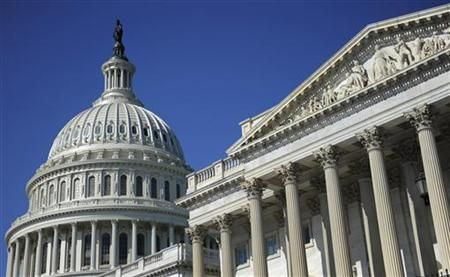Government Shutdown Averted, Congress Focuses on Payroll Tax Cut

After Congressional negotiators signed off Thursday night on a $1 trillion omnibus spending bill that would avert a shutdown and fund the federal government through September, lawmakers' focus returned to the ongoing negotiations over the extension of the payroll tax cut.
The linchpin of the latest round of Congressional sniping, in a year rife with partisan strife, faces substantial hurdles towards passage, leaving legislators to mull reverting to their favorite scapegoat -- stopgap spending measures.
The extension of a 2 percent cut in the payroll tax, keeping it at its current 4.2 percent rate for employees, was the most substantive chunk of President Barack Obama's jobs bill to reach Capitol Hill. Senate Democrats answered the White House's call to use it to stage a populist battle against Republicans, adopting the bill wholesale, including a provision to fund the cut through a surtax on incomes over $1 million.
The tax cut is set to expire on Dec. 31, with the Obama administration demanding Congress remain in Washington D.C. until a deal is ironed out, working through the holidays if necessary. But a vast gulf still divides both parties, widened by several controversial additions to the House Republican version of the extension, including the expedited passage of the controversial Keystone XL pipeline, an extension of unemployment benefits set to expire and the return of restrictions on travel to Cuba.
The seemingly wide divide has pushed back some chances of a deal, and various reports state both parties are mulling a continuing resolution to keep the current rate and unemployment benefits for two more months, extending the negotiating window for Congress.
Reid on Payroll Tax Cut Extension: We're Very, Very Close
Senate Majority Leader Harry Reid, D-Nev., said on Thursday he plans to convene with Minority Leader Mitch McConnell, R-Ken., to come up with something that will get us out of here at a reasonable time in the next few days.
We're not there yet, but we're very, very close, he added.
Democrats have reportedly dropped the surtax in an effort to garner Republican support. Several measures that included some form of the tax did not cross the 60-vote procedural hurdle required to overcome a filibuster, after Senate Republicans banded together against the plan.
In its stead, they are reportedly proposing other revenue sources, including fees on Fannie Mae and Freddie Mac-backed mortgages, as well as portions of the tax code that benefit high earners.
Democrats are also seeking to include in the bill an extension of renewable energy grants set to expire on Dec. 31.
I don't think that's final at this point, Sen. Kent Conrad, D-N.D., told Bloomberg. That's what we're pushing for.
Meanwhile, the Keystone XL pipeline's expedited approval remains a controversial linchpin in any deal, as the President has promised to veto any bill that includes the provision. House Speaker John Boehner, R-Ohio, has stated the 1,700-mile pipeline must be included in any deal, calling it a job creating, shovel-ready project.
But its inclusion, along with the surfacing talk of alternative energy grants, shows that members of Congress, even during 11th hour negotiations, can still take the time to remember their more monetarily benevolent supporters.
The pipeline, an obvious boon for the nation's oil industry, is widely supported by Congressional Republicans. According to the Center for Responsive Politics, GOP members of Congress received a total of nearly $8 million in contributions from the oil and gas industries for their 2012 campaigns, as opposed to Democrats' $1 million. Conversely, Democrats have enjoyed a substantial margin of support from environmental groups.
Should no deal be ironed out, a $40 billion stopgap measure will likely be enacted, buying Congress some time to reach a more substantive agreement.
© Copyright IBTimes 2025. All rights reserved.




















